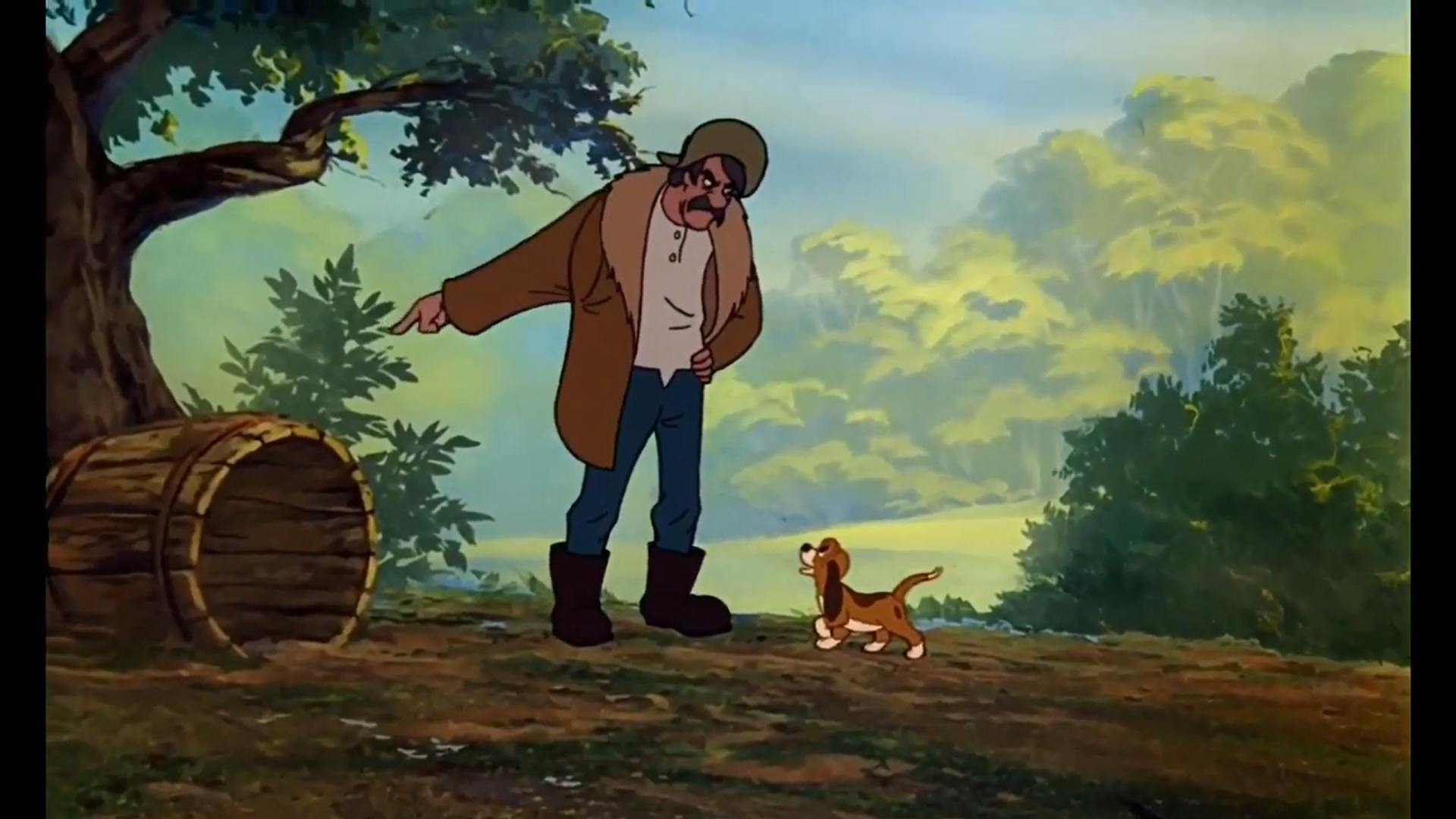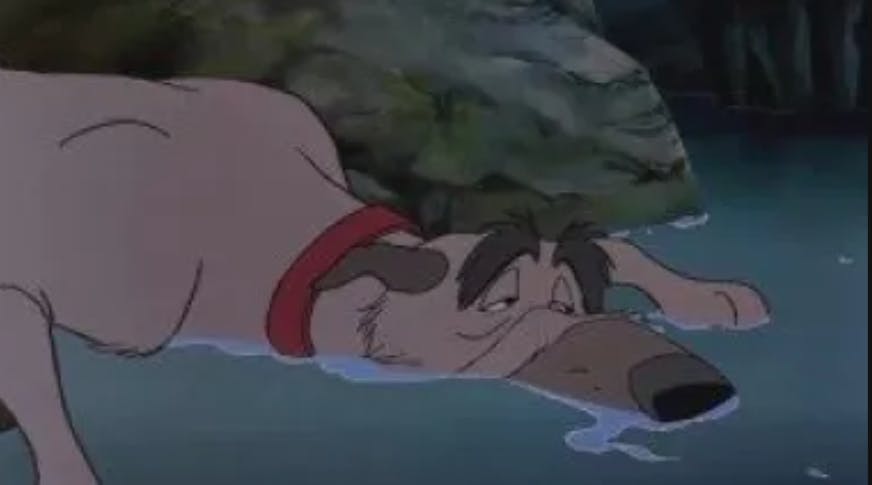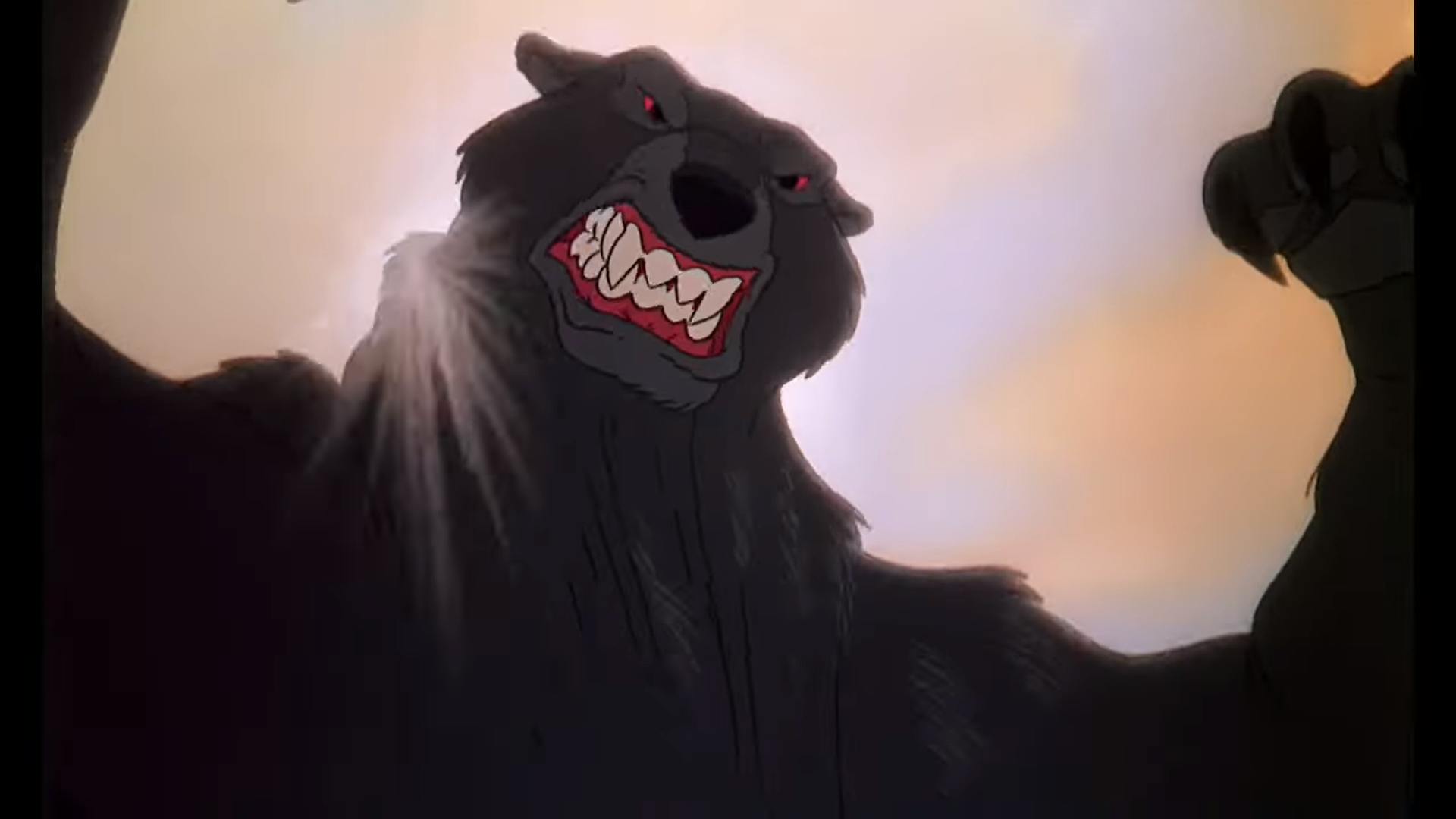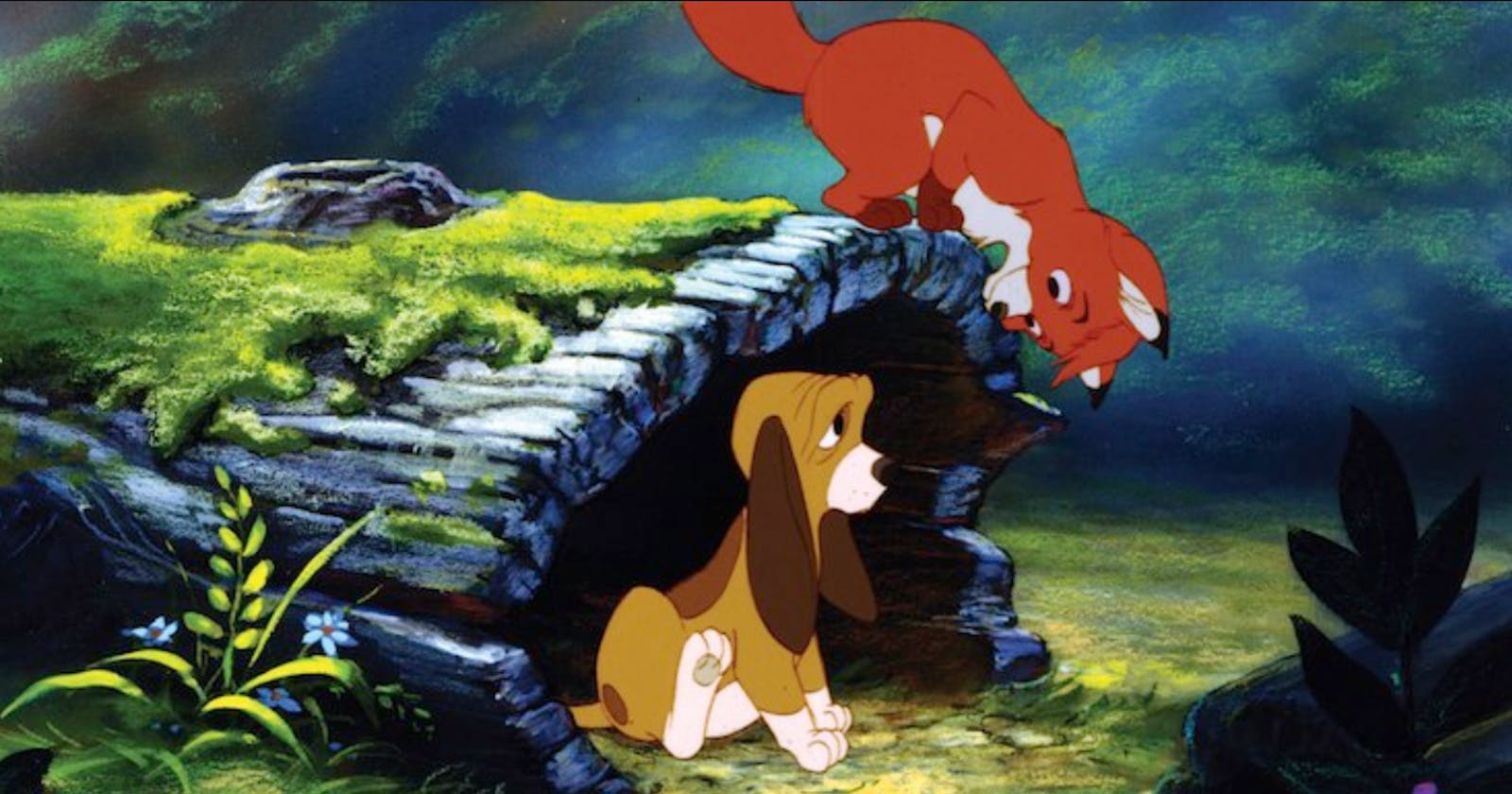Race & Responsibility: The Fox & The Hound
Revisiting one of Disney's most beloved cartoon
I recently had the pleasure of revisiting one of my favourite old-time Disney cartoons. The Fox & The Hound (1981). When I was around the age of 6 or 7, I would watch this film with my parents on cassette tapes. Now, on a bootleg video platform on my LCD screen laptop.
As an adult, you look back at the most famous children’s cartoons and extract the lessons and themes from them. The more Disney cartoons I watch the more I realise that these stories, based on older stories, were written for the captivation of adults as well as for the delight of children. (However, there was a point in Disney’s history where the cartoon’s stories declined in plot, meaning and quality — i.e. Frozen)
The Fox & The Hound tells the story of a young orphaned fox, Todd, who has an unlikely friendship with a hunting dog, Copper. As the seasons change, both Todd and Copper grow older and become more mature, but that growth pushes both of them apart: Todd being the wild and forest-dwelling fox and Copper growing into the hunting dog that would one day potentially kill Todd.
I really like the cartoon because it highlights many of the issues all of us face in our personal friendships with one another. I’ve been thinking about friendships I had and where they went terribly wrong based on the plot of this story.

When I was younger, I had friends who were very different to me: class, race, culture etc. but we were in this primordial state without duties or responsibilities that it didn’t matter what race or culture we came from. However, like Copper, there was always a calling to come back to the reality of the divisions that existed; that although you’re friends today, your duty and your responsibilities as an adult are going to conflict with that in the future.

I like Mrs Widow, she reminds me of —well, pretty much all the other widows in the world who still have motherly attributes left within them. There are many old ladies whose husbands have died, and their own children are very far away. It’s no surprise that Nature, it's fun and amusing sides presented as two comical birds and a caring owl, knocks at her door and leads her to take care of this vulnerable and orphaned fox.
I like the message that the film sends when first presenting ‘Big Momma’ as the owl. Even though she may be the caring mother as her name suggests, ‘Big Momma’ the owl knows that even she cannot take care of a fox, being just a surface part of Nature itself. Whereas Mrs Widow, although she is human, she is integrated into care and responsibility, thus she is the most suitable. It’s non-negotiable for an orphaned child to have a mother, and not just any old mother, but a competent mother who demonstrates how to care, how to love, and how to adore.
Todd’s friendship with Copper is hidden in the wilderness from Chief, the older hunting dog, and his grumpy and gun-slinging owner Amos Slade. Whenever Todd the fox enters the farm to see Copper, finally tied up so that he can’t go wondering off and meet Todd in the woods, all hell breaks loose as Chief barks and bites and hunts him down while Slade fires his gun, relentlessly aiming to kill the young and frightened fox. This happens multiple times. Slade’s rage carries him to harass Mrs Widow about letting her fox loose on his farm.

It may seem that the world would be much better if Amos Slade and his reckless behaviour (and his gun) would just be done with. After all, he is the one keeping Copper and Todd apart, despite their friendship is an unlikely one, it is a friendship nonetheless. Why shouldn’t they be friends? What does an old grouch like Amos Slade know about the power of friendship? We should just do away with him and his gun.

‘Amos’ comes from the old Hebrew name meaning ‘burden’. The name Amos has a deeper meaning than ‘burden’ in fact. It means ‘bearer of the burden given by God’. Amos, in the Old Testament, is told by God to carry the kingdom of Israel. You can see that the gun-slinging Amos bares the same large burdens and responsibilities, albeit executes by brutal force the best ways he knows how. Amos, however, also represents the traditions of the past and the traditions of human beings. Seeing that Chief is getting older and his tracking skills are wearing away, he introduces Copper, a younger and newer dog, allowing the traditions of the past to rejuvenate and continue, such as the kingdom of Israel in the Old Testament. Although his recklessness and violence are harsh, he represents an order and a calling to responsibility, where if it were otherwise it may descend into wild chaos.
Once Copper goes away with Slade and Chief for the hunting season, he returns home bigger, stronger and much tougher than when he first left. Todd, who has also grown up, sees just how big Copper has become, and realises that things have deeply changed.
Copper eventually develops an understanding and empathy for Chief, as he learns how to track prey animals such as rabbits, birds, squirrels and —foxes. When Copper and Chief return to the farm, Todd gets a nasty chase-down by Chief. In an attempt to catch the fox, Chief runs onto the train tracks, misses Todd, and gets hit by a train, falling down into the creek. Seeing Chief injured, lying in the water after being hit by a train, Copper’s sympathy for Chief turns to a deep hatred for Todd as he was the cause of this disaster.

Copper’s love for the culture totally outweighs the childhood friendship he once had with Todd. He is so gripped by the ideology that he sees Todd as a threat and an enemy.
Meanwhile, Mrs Widow knows that her love, like all mothers’ love for their children, has to let them be who they need to be. A fox can’t stay kept in the house as a young man can’t stay forever in his mum’s basement. We all have to go out and get the life that is for us.
The life that is for us can be a very difficult and lonely process to find. Todd goes through a deeply depressing night of thunder, cold and rain after being let go by Mrs Widow.
The hero who leaves home will inevitably lose his best friend and his mother. However, in order to grow and to be more integrated into who he is, Todd must adapt to the forest. He meets Vixey, a beautiful lady fox, who sees just how clumsy he is when stumbling around the forest and unsuccessfully trying to catch fish. With a little help from Big Momma, who represents Mother Nature’s caring and loving spirit, Vixey and Todd become romantic with each other.

Meanwhile, Slade’s anger for the fox still hasn’t rested, not after what happened to old Chief (who is also trying to milk all the good treatment an injured dog can get). Slade and Copper go out to hunt the fox and almost trap Todd in a series of metal traps.
Question: What happens when you’re so hellbent on killing to keep order? You get attacked by a bear.

When Vixey and Todd escape Copper and Slade’s murderous pursuit, Slade is met by a ferocious and deadly grizzly bear. Rushing to try to re-load his gun, he trips and stumbles back on the fox traps, as the grizzly bear runs closer towards him. Copper fends him off, but Copper’s strength is no match for the bear’s might and Copper is flung to the side.
Watching this scene, I couldn’t help think of a parallel with my own friendships. I’ve met and been close friends with people who are so relentless to keep their culture that it sends them into a tyrannical rage. In university, I was friends with many black students. In my spare time, I wrote poetry and made music, and I absorbed whatever was around me and wrote down my thoughts in these poems: some of the poems spoke about the cultural dynamics between black people. I admit, all of these poems were trash and not well-written. In fact, none of them made much sense but rather jumbled into an incoherent stream of thinking. On reading some of my poetry, one of the students took this as an insult and ignorance towards their ‘culture’ and ‘heritage’. Many of them grouped together, had meetings, sent emails, spoke to BLM activists and tried to figure out ways to ‘cancel’ me. The hatred in defence of the culture escalated so much that many of them were determined to end my time at university, cancel my degree and make sure that I paid for crossing into their territory and insulting it. All I was really doing — like Todd the fox — was exploring unknown territory. The fact I was an outsider, while not being integrated as an adult into society, meant that any exploration I did was, by default, a racist insult.
You may be so gripped in your ideology to hunt and kill foxes, but there are far, far more dangerous and far more violent beasts Mother Nature is going to conjure up (such as bears) that not even your culture, or your race or your group-mentality is going to be able to fight it. More likely, it may be that someone who is willing to explore and have some courage to cross into unknown territories, such as the ‘black community’, is going to be the one to save you from the disasters of life and the monsters that lurk in the shadows.
Hearing this attack, Todd rushes to the scene and bravely fights the bear, distracting it away from Copper and Slade. The bear follows Todd to the edge of a waterfall, still bravely persevering against the bear’s deadly claws. Todd clinging to a branch, the bear smites Todd, ripping the branch and both of them fall down into the rushing water.

Copper finds Todd by the bottom of the river, barely alive and weak. There is a refrain here to the time that Chief was struck by a train and fell into the valley’s creek. Chief was hit by a train, an unstoppable force of the mechanical and human world, whereas Todd was struck by a bear, an unstoppable force of the natural world.
This makes a hint to assigning each person a contention of their culture. Todd cannot withstand a train (human), but he can withstand a grizzly bear (nature). Each culture has its own dangerous and ferocious monster. Black communities have demons and monsters which only Black people can withstand and contend with, likewise for white communities. In societies, once the most dangerous monsters manifest themselves and begin causing carnage cross-culturally, only the minor products of the same culture —e.g. the people of the culture — can contend and wrestle with the monster. Therefore, it's counterproductive to condemn those people and villainise them as monsters when in fact they will be your greatest ally in defeating the much bigger monster. Todd the fox was able to fend off the grizzly bear, whereas Copper couldn’t, because Todd is also a product from the same source, the same culture.

Again, Copper attends to the wounded, and with Slade pointing his gun at the injured fox, Copper steps in front of the gun. Slade then realises his error. He understands that killing Todd would not be a victory, but a shameful and prideful sin.
I’ve learned a lot by exploring my old Disney cartoons. When you take a step back and just reflect on the themes and lessons, you understand that these stories were not written for a child audience, but rather for adults.
I suppose once you’ve been through failing relationships, once you’ve ended friendships, and once you’ve made accomplishments, it’s good to sit back and watch the cartoon play out one more time. I’m sad that my friendships ended because people were possessed by ideologies. Like me, cartoons might help you understand the painful traumas and trials of your life, and can also give you hope as to where it’s going to go.
